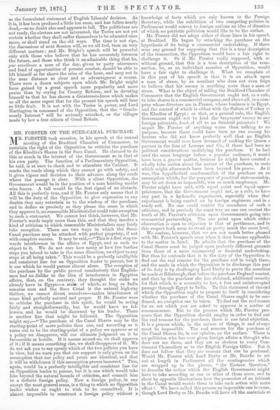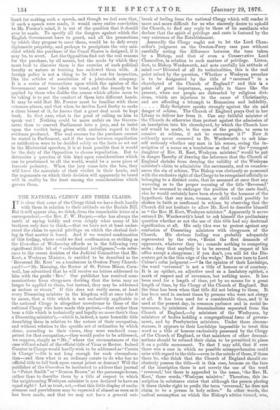MR. FORSTER ON THE SUEZ-CANAL PURCHASE.
MR. FORSTER took occasion, in his speech at the annual meeting of the Bradford Chamber of Commerce, to maintain the right of the Opposition to criticise the purchase of the Khedive Shares in the Suez Canal. He claimed to do this as much in the interest of the Government as in that of his own party. The function of a Parliamentary Opposition, he said, is at once to check and to stimulate the Cabinet. It marks the roads along which they cannot go with safety, and it gives vigour and decision to their advance along the roads where the passage is clear. With a silent Opposition, the Government would be in the position of a man hunting amidst wire fences. A fall would be the first signal of an obstacle. All this is perfectly true' and if Mr. Forster only means that it will be the duty of the Opposition to give expression to any doubts they may entertain as to the wisdom of the purchase, and to define as precisely as they please the sense in which they approve it, no reasonable Ministerialist could take exception to such a statement. We cannot but think, however, that Mr. Forster's words imply more than this, and that they involve a kind of criticism to which reasonable Ministerialists may fairly take exception. There are two ways in which the Suez- Canal purchase may be attacked with perfect propriety, if not with complete success. It may be said,—" This is a first step to- wards interference in the affairs of Egypt, and as such we object to it. We do not care how many or how few further steps you intend to take in the same direction, we object to any steps at all being taken." This would be a perfectly intelligible and consistent line for an Opposition leader to pursue, but it is one which he would pursue almost alone. The reception of the purchase by the public proved conclusively that English- men had no dislike to the idea of interference in Egyptian affairs, that, on the contrary, they thought the stake we already have in Egypt—a stake of which, so long as India remains ours and the Suez Canal is the natural highway thither, we cannot divest ourselves—makes interference of some kind perfectly natural and proper. If Mr. Forster were to criticise the purchase in this spirit, he would be acting fairly and straightforwardly, but he would have no fol- lowers, and he would be disowned by his leader. There is another line that might be followed. The Opposition might say,—" The purchase of the Canal Shares may be the starting-point of more policies than one, and according as it turns out to be the starting-point of a policy we approve or of a policy we disapprove, will our ultimate judgment on it be favourable or hostile. If it means so-and-so, we shall approve of it; if it means something else, we shall disapprove of it. We do not ask you to say openly which of the two policies you have in view, but we warn you that our support is only given on the assumption that our policy and yours are identical, and that it will be withdrawn if this assumption proves incorrect." This, again, would be a perfectly intelligible and consistent line for an Opposition leader to pursue, but it is one which would take him beyond the natural bounds of criticism, and commit him to a definite foreign policy. Now a foreign policy, in any except the most general sense, is a thing to which no Opposition leader wishes or ought to wish to be committed. It is almost impossible to construct a foreign policy without a knowledge of facts which are only known to the Foreign Secretary, while the exhibition of two competing policies in Parliament would convey to foreign nations an idea of disunion of which no patriotic politician would like to be the author.
Mr. Forster did not adopt either of these lines in his speech at Bradford. He began by attacking the purchase on the hypothesis of its being a commercial undertaking. If there were any ground for supposing that this is a true description of the transaction, the Opposition would have a fair right to challenge it. Or if Mr. Forster really supposed, with or without ground, that this is a true description of the tran- saction, he, as an individual member of Opposition, would have a fair right to challenge it. What we complain of in this part of his speech is that it is an attack upon a man of straw, by an assailant who does not even feign to believe that his enemy is anything more than a man of straw. What is the object of telling the Bradford Chamber of Commerce that the English Government ought not, as a rule, to take shares in a commercial company, and above all, in a com- pany whose directors are in France, whose business is in Egypt, and the control of which is either with the Sultan of Turkey or the Khedive of Egypt ; or that, as a general rule, the English Government ought not to lend the taxpayers' money to any foreign potentate, least of all to an Oriental potentate ? We acquit Mr. Forster of anything worse than talking to no purpose, because there could have been no one among his hearers who did not know perfectly well that no English Government would ever have dreamed of making the Queen a partner in the firm of Lesseps and Co., if there had been no political considerations underlying the purchase. If he had used the same language before a popular audience, it would have been a graver matter, because he might have created a wholly false notion about the nature of the purchase, to undo which might afterwards have been beyond his power. As it was, this hypothetical condemnation of the purchase on an assumption which, for the purposes of practical statesmanship, may be set down as impossible, was so much surplusage. Mr. Forster might have said, with equal point and equal appro- priateness, that the Government ought not, as a rule, to have any part in a hydraulic experiment, especially when that experiment is being carried on by foreign engineers and in a sandy soil. No one could contest the soundness of such a criticism, and in precisely the same way no one can contest the truth of Mr. Forster's criticism upon Governments going into commercial partnerships. The one point upon which either observation is open to objection is that of pertinence, and in this respect both seem to stand on pretty much the same level.
We confess, however, that we are not much better pleased' with Mr. Forster's speech even when it does become applicable to the matter in hand. He admits that the purchase of the Canal Shares must be judged upon perfectly different grounds from those of a mere commercial or financial undertaking. But then he contends that it is tge duty of the Opposition to find out the real reasons for the purchase and to weigh them, and the mode in which the Opposition is to discharge this part of its duty is by challenging Lord Derby to prove the assertion he made at Edinburgh, that before the purchase England wanted, and that by the purchase she has obtained, additional security for that which is a necessity to her, a free and uninterrupted passage through Egypt to India. To this statement of the end which the Opposition ought to propose to itself in considering whether the purchase of the Canal Shares ought to be con- firmed, no exception can be taken. To find out the real reason for an act which you are asked to approve is a matter of common-sense. But to the process which Mr. Forster pro- poses that the Opposition should employ in order to find out the real reasons for the purchase, there is one fatal objection. It is a process which, in the nature of things, is and always must be impossible. The real reasons for the purchase of the Canal Shares lie, in our opinion, on the surface. There is no politician who has ever given foreign affairs a thought who does not see them, and they are as obvious to every Con- tinental Chancellery as to the English Foreign Office. But it does not follow that they are reasons that can be produced. Would Mr. Forster wish Lord Derby or Mr. Bourke to set out at length in Parliament all the contingencies which are wrapped up in the phrase, "the Eastern Question," to describe the action which the English Government might have to take according as one or other of them arose, and to show by apposite illustrations how the possession of an interest in the Canal would enable them to take such action with more effect ? We have called this process an impossible one because, though Lord Derby or Mr. Bourke will have all the materials at land for making such a speech, and though we feel sure that, if such a speech were made, it would carry entire conviction to Mr. Forster's mind, it is out of the question that it should ever be made. To specify all the dangers against which the English Government have to guard, and all the precautions by which they propose to meet them, would be to defy every diplomatic propriety, and perhaps to precipitate the very mis- chief which the purchase of the Canal Shares is designed, if it may be, to avert. Let the Opposition find out the real reasons for the purchase, by all means, but the mode by which they must look to discover them is the exercise of such political faculty as nature or training has endowed them with. A foreign policy is not a thing to be laid out for inspection, like the articles of association of a joint-stock company. It is a series of transactions upon which the opinion of the Government must be takeh on trust, and the remedy to be applied by those who dislike the course which affairs seem to be taking is to put the conduct of them into different hands. It may be said that Mr. Forster must be familiar with these common-places, and that when he invites Lord Derby to make a clean breast of it, he knows that a great deal must be kept back. Ls that case, what is the good of calling on him to speak out ? Nothing could be more unfair on the Govern- ment than to convert Parliament into a jury, and to insist upon the verdict being given with exclusive regard to the evidence produced. The real reasons for the purchase cannot be stated in Parliament, and if the issue between repudiation or ratification were to be decided solely on the facts as set out in the Ministerial speeches, it is at least possible that it would be the duty of the Opposition to choose repudiation. But to determine a question of this kind upon considerations which can be proclaimed to all the world, would be a mere piece of forensic pedantry. When the jury come into the box, they will have the materials of their verdict in their heads, and the arguments on which their decision will apparently be based will in reality be the least among the considerations which govern them.







































 Previous page
Previous page